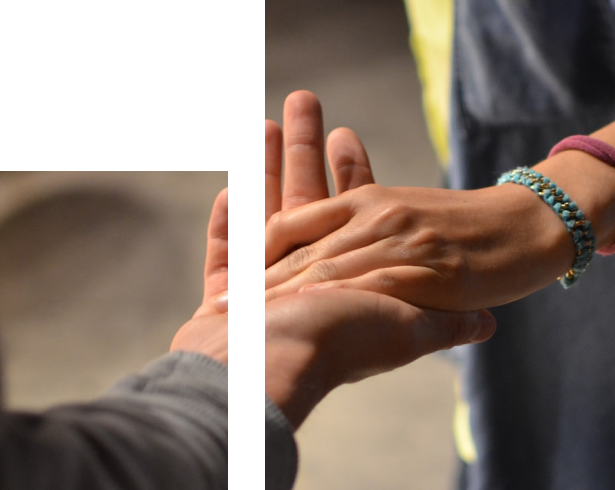
The philosophy philosophy
In the early days of the Maison Médicale, our operating system was based on fee-for-service, as elsewhere.
We were not satisfied with this way of working for a number of reasons, including the following:
" What is the basis of fee-for-service? It's disease!"
In this logic, the more sick patients we saw, the more money we earned: Illness financed our salary and determined our quality of life.
Of course, we were paid for our work, but in our opinion, our role is above all to maintain and restore the health of the patients who come to us for as long as possible.
For us, the fee-for-service system was therefore contradictory and even unhealthy in relation to our objectives, which are :
- Facilitating equal access and quality of care for all;
- Helping patients to achieve maximum autonomy;
- Aiming for prevention and health education to take on increasing importance over curative care
.
This fee-for-service system considerably limited our work, as only illness could challenge us and justify our interventions.
It was not possible for us to suggest to you, the patients, that you consult the medical team simply for examinations or preventive advice once you had been relieved of your acute problem (whether in the medical, physiotherapy or nursing field).
In good conscience, we couldn't offer you this type of contact because we had to ask you to pay for it.
These are the reasons why we decided to look for another system of payment for the work done by the Maison Médicale, a system that rewards the conquest and maintenance of health: the flat-rate subscription system that finances health, not illness.
The package: a system based on solidarity
A system that's not free.Patients, both old and new, often tell us they don't understand the system for paying for care at the Maison Médicale and its supposed "gratuity". We also hear patients who are not yet registered tell us "Put it on my wife's account" (who is registered). And yet...
To answer all these questions, we would like to present the following reflections.
This system is based above all on a notion of solidarity between everyone, young and old, employed and unemployed, salaried and self-employed... Everything is done through a deduction from earned income.
So, if you earn €100 gross, your taxable salary will be just €86.93, from which a further deduction (13.07%) will be taken before arriving at your net income.

Where does the €13.07 go?
- 4.70 is paid to the health and disability insurance scheme (mutuelle);
- 0.87 is paid to an unemployment fund for the payment of income to the unemployed;
- 7.50 is paid to a pension fund to pay the pensions of current pensioners.
But the €100 of your gross salary will actually cost your boss €132.39 because he'll have to pay the following amounts:
- 6.15 is paid to the health and disability insurance scheme (mutuelle);
- 1.46 is paid to an unemployment fund for the payment of income to the unemployed;
- 8.86 is paid to a pension fund to pay the pensions of current pensioners;
- 7.00 are paid to family allowances for the payment of children's family allowances;
- 0.30 are paid to a fund used to compensate work-related accidents;
- 1.10 is paid into a fund for the payment of occupational diseases;
- 7.48 for wage restraint and €0.04 for miscellaneous charges.

As you can see, solidarity exists because everyone contributes and, since it's a percentage, those who earn a lot contribute more than those who earn less.
We can also see that the employer's share is quite high, and it's on these amounts that discussions take place when it comes to reducing the cost of labor.
And, finally, when you file your tax return and have to pay extra, some money still goes to social security. Out of every €100 of tax paid, €22.6 goes to all these services.
All this to show you that, through your work, you're already paying for part of your healthcare (€4.70 deducted from your gross salary + €6.15 paid by your boss, i.e. €10.85 per €100 gross salary), not to mention the tax deduction. Do the math with your next pay slip and you'll see that these sums aren't insignificant.
These are the sums that enable you to claim reimbursement for your medical care and medication. As we saw above, you pay for your health care through your job.
In 1983, members of Maisons Médicales were looking for ways to improve access to care, and to find an alternative to fee-for-service financing (where you pay your doctor every time you visit).
Indeed, they realized that having to pay for doctors, physiotherapists and nurses was becoming a major financial handicap for some, leading them to opt out of medical care.
On the other hand, in the fee-for-service system, doctors earn a good living as long as they see a lot of people, which sometimes leads to over-consumption (repeated, unnecessary visits, for example).
These and other considerations, carried out in conjunction with GERM (Groupe d'Etude pour une Réforme de la Médecine), prompted the Maisons Médicales to ask INAMI (Institut National d'Assurance Maladie Invalidité) to try out another, even more solidarity-based financing method: the lump-sum system.
Under this system, the Maison Médicale receives a fixed monthly lump sum for each individual subscriber, whether or not that person comes in. This amount is the result of sophisticated calculations carried out by the RIZIV, and is based on the average consumption of the different categories of Belgians (ordinary insured, VIPO 75% and VIPO 100%).
In practical terms, if Belgians spent X million on general medicine in a given year, the lump sum paid to the Maison Médicale would be X million divided by 11 million Belgians divided by 12 months, i.e. x € per month. The same applies to physiotherapy and nursing care.
It's your mutual insurance company that pays us the monthly lump sum. This system is not "free", since you pay contributions through your work, which enable your mutual insurance company to pay these amounts. In our view, it is an even more supportive system than the fee-for-service system, which is why we decided to switch to it on April 1, 1992.
In return, we are obliged to provide all subscribers with general medical, physiotherapy and nursing care.
While this system ensures maximum financial accessibility to care for patients, it only works for the Maison Médicale when we have a sufficient number of subscribers to enable us to pay caregivers' salaries and all other operating costs. At present, 4600 subscribers have placed their trust in us, for which we are very grateful.
What's more, everyone should use the system with the same spirit of solidarity. We couldn't continue with this system if we were faced with a very large number of patients who were over-consuming care without really needing it. The doctors, physiotherapists and nurses at the Maison Médicale would then no longer be available to provide care to those who really needed it. It's up to each and every one of us to use the system "with due care".
We remain at your disposal should you require any further information on this subject. We look forward to hearing from you!
